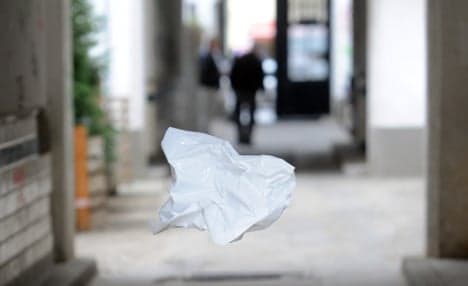Rewe pulls 'deceptive' bio-bags from shops

Supermarket giant Rewe has pulled its "100% biodegradable" bags from shops after an environment organisation called them a "particularly cheeky case of consumer deception."
Germany's second largest supermarket bowed to mounting pressure on Thursday in the wake of a campaign by environmental group Deutsche Umwelthilfe (DUH) against the bags.
It says they are 70 percent oil and 30 percent polyactic acid, take weeks to decompose and cannot even be recycled.
DUH says the bags have been causing problems when they end up in food waste recycling plants.
Food recycling plants take around six weeks to compost the food waste they receive. The bags arrive at the plant in their hundreds - mixed with food waste - as consumers are under the impression they are biodegradable.
But the DUH says they take twice as long to decompose than the rest of the waste and even then they don't disappear completely - 10% remains in the compost.
"It is completely false to suggest to consumers that they're doing something good for the environment (by using the bags)," Herbert Probst, who runs two compost plants and is head of the Soil and Compost Association of Northern Germany told the taz newspaper on Thursday.
Rewe has denied that the bags are not compostable – but decided to withdraw the bags anyway. This was to avoid further customer uncertainty over their environmental impact, a spokesman said on Thursday in Cologne.
Rewe feels misrepresented by DUH and defended the bags - which partially contain vegetable raw material - as "a first step towards using less fossil resources such as oil."
Aldi, which also sells the bags, has not yet responded to DUH's claims.
DADP/The Local/jlb
Comments
See Also
Germany's second largest supermarket bowed to mounting pressure on Thursday in the wake of a campaign by environmental group Deutsche Umwelthilfe (DUH) against the bags.
It says they are 70 percent oil and 30 percent polyactic acid, take weeks to decompose and cannot even be recycled.
DUH says the bags have been causing problems when they end up in food waste recycling plants.
Food recycling plants take around six weeks to compost the food waste they receive. The bags arrive at the plant in their hundreds - mixed with food waste - as consumers are under the impression they are biodegradable.
But the DUH says they take twice as long to decompose than the rest of the waste and even then they don't disappear completely - 10% remains in the compost.
"It is completely false to suggest to consumers that they're doing something good for the environment (by using the bags)," Herbert Probst, who runs two compost plants and is head of the Soil and Compost Association of Northern Germany told the taz newspaper on Thursday.
Rewe has denied that the bags are not compostable – but decided to withdraw the bags anyway. This was to avoid further customer uncertainty over their environmental impact, a spokesman said on Thursday in Cologne.
Rewe feels misrepresented by DUH and defended the bags - which partially contain vegetable raw material - as "a first step towards using less fossil resources such as oil."
Aldi, which also sells the bags, has not yet responded to DUH's claims.
DADP/The Local/jlb
Join the conversation in our comments section below. Share your own views and experience and if you have a question or suggestion for our journalists then email us at [email protected].
Please keep comments civil, constructive and on topic – and make sure to read our terms of use before getting involved.
Please log in here to leave a comment.